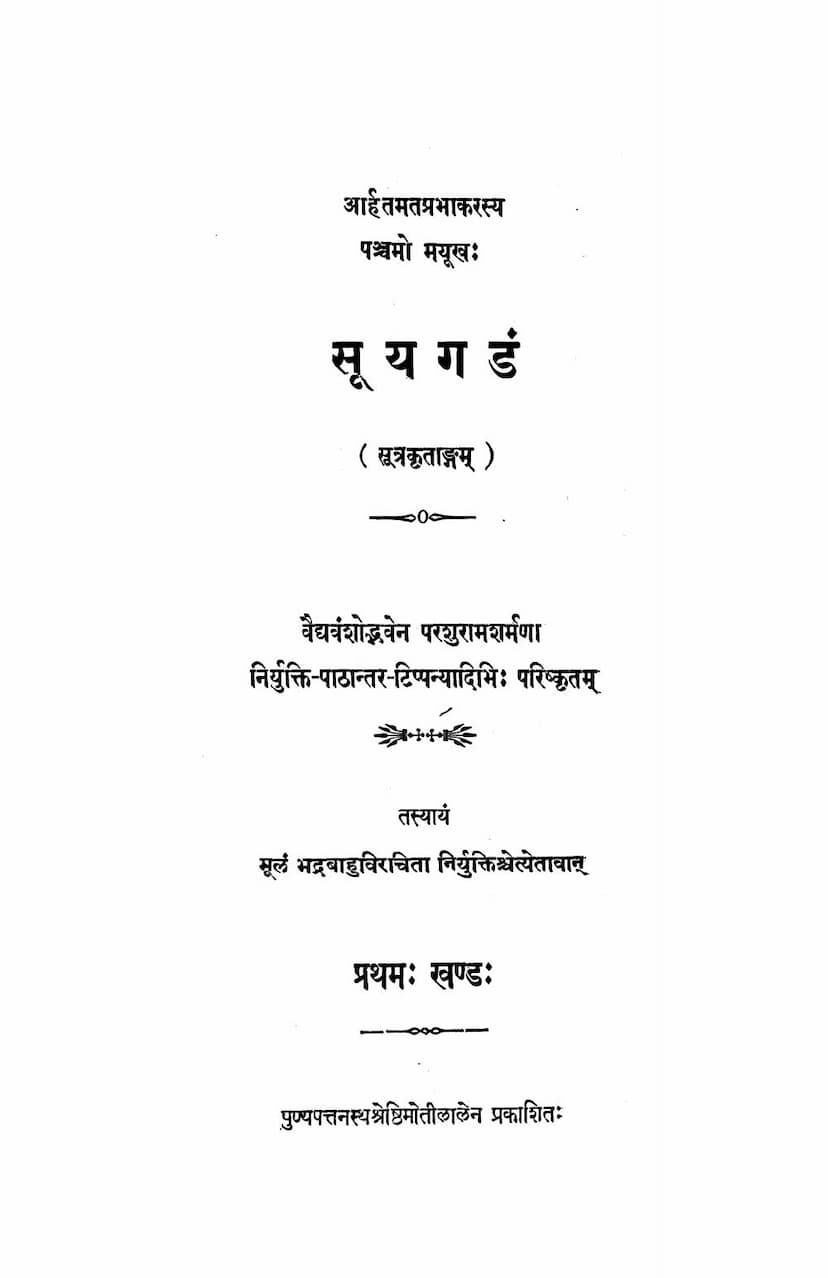Suyagadam Part 01
Added to library: September 2, 2025

Summary
Here's a comprehensive summary of the Jain text "Suyagadama Part 01" based on the provided pages:
Book Title: Suyagadama (Sutrakṛtāṅga) Author: P. L. Vaidya (Critical Edition) Original Author of Niryukti: Bhadrabahu Publisher: Motilal Sheth Content: This is the first part of the critically edited text of the Sutrakṛtāṅga, the second book of the sacred canon of the Svetambara Jains. It includes the original text in Ardhamagadhi Prakrit, the Niryukti (commentary), various readings, and notes. The preface by P. L. Vaidya highlights the rarity of existing editions and the need for a critical edition to aid students of Ardhamagadhi.
Summary of the Text (Based on the provided pages):
The provided pages contain a significant portion of the Sutrakṛtāṅga, specifically focusing on refuting various philosophical viewpoints and establishing the Jain path. The text is structured into chapters (adhyayana) and sections (uddeśa). The content primarily comprises:
-
Discussions on Metaphysics and Ontology:
- Critique of Materialism and Nihilism: The text strongly refutes the views of those who believe in the non-existence of the soul, the self, or an afterlife, and those who deny the consequences of actions (karma). It criticizes philosophies that claim the universe is solely composed of material elements (the five Mahabhutas: earth, water, fire, air, and space) and that destruction of the body means annihilation of the soul.
- Rejection of Eternalism and Annihilationism: The text addresses various schools of thought regarding the nature of existence, including those who believe in an eternal, unchanging universe and those who believe in complete annihilation after death.
- Emphasis on Karma and Rebirth: A central theme is the doctrine of karma, explaining that actions (both good and bad) have consequences and influence future births and experiences. It emphasizes that suffering arises from one's own actions.
-
Ethical Teachings and the Path to Liberation:
- Ahimsa (Non-violence): The paramount importance of non-violence is consistently stressed. The text advocates for refraining from harming any living being, from the smallest to the largest, and through all means (mind, speech, and body).
- The Jain Path (Brahma-charya, Renunciation): The text outlines the practices of ascetics, including restraint, celibacy, detachment from worldly possessions and pleasures, and rigorous self-discipline. It highlights the path of renunciation as the means to overcome suffering.
- Critique of External Practices: The text criticizes those who rely on external rituals, penances, or appeasement of deities for salvation, without inner purification and understanding of true dharma. It rejects the idea that merely adhering to certain practices or belonging to a particular caste guarantees liberation.
- Importance of Right Knowledge, Right Faith, and Right Conduct: Although not explicitly detailed in these pages, the underlying message points towards the Jain path of three jewels (Triratna) for achieving liberation.
-
Critique of Other Religious and Philosophical Schools:
- Refutation of Various Sects: The Sutrakṛtāṅga, through its Niryukti, systematically critiques numerous heterodox religious and philosophical traditions prevalent at the time. It exposes their flaws, inconsistencies, and ultimately, their inability to lead to true liberation.
- Specific Philosophical Tenets Addressed: The text discusses and refutes various specific philosophical ideas such as:
- The belief that only the five great elements constitute reality.
- The idea that actions have no consequences.
- The denial of rebirth or transmigration.
- The emphasis on sensory pleasures and worldly attachments.
- The belief in divine creation or a supreme creator.
- The practice of various penances without proper understanding.
-
The Importance of Wisdom and Discrimination:
- Distinguishing Truth from Falsehood: The text emphasizes the need for wisdom and discernment to differentiate between true dharma and false doctrines.
- Avoiding Attachment: It stresses the importance of detachment from worldly desires, relationships, and possessions, as these are seen as impediments to spiritual progress.
Key Concepts and Themes:
- Karma: The inexorable law of cause and effect, where every action has a consequence.
- Ahimsa (Non-violence): The supreme principle of Jainism.
- Renunciation (Tyaga): Giving up worldly attachments and pleasures for spiritual liberation.
- Self-Control (Samvara): Restraining the senses and passions.
- Liberation (Moksha/Nirvana): The ultimate goal of escaping the cycle of birth and death.
- Critique of Other Sects: A significant portion involves refuting the doctrines of other contemporary philosophical and religious schools.
- The Nature of the Soul (Jiva) and Non-Soul (Ajiva): Though not explicitly detailed in these pages, the discussions on existence and consciousness imply these core Jain concepts.
Overall:
The Sutrakṛtāṅga, as presented in this critical edition, serves as a foundational text for understanding Jain philosophy, ethics, and cosmology. It functions as a defense of the Jain path by systematically dissecting and refuting alternative viewpoints, thereby establishing the superiority and truth of the teachings of the Jinas. The Niryukti provides valuable insights into the context and interpretation of these teachings.